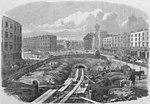The timeline of the transport system now known as the London Underground began in 1863 with the Metropolitan Railway, the world's first underground railway. Over the next forty years, the early sub-surface lines reached out from the urban centre of the capital into the surrounding rural margins, leading to the development of new commuter suburbs. At the end of the 19th and beginning of the 20th century, new technology—including electric locomotives and improvements to the tunnelling shield—enabled new companies to construct a series of "tube" lines deeper underground. Initially rivals, the tube railway companies began to co-operate in advertising and through shared branding, eventually consolidating under the single ownership of the Underground Electric Railways Company of London (UERL), with lines stretching across London. In 1933, the government brought the UERL and the Metropolitan Railway together as a single organisation, the London Passenger Transport Board. The London Underground has since passed through a series of administrations, expanding further by the construction of new extensions and through the acquisition of existing main line routes, culminating in its current form as part of Transport for London, the capital's current transport administration, controlled by the Greater London Authority.
Recently selected: 2015 Wootton Bassett SPAD incident - Timeline of railway electrification in Norway - Arlanda Express
